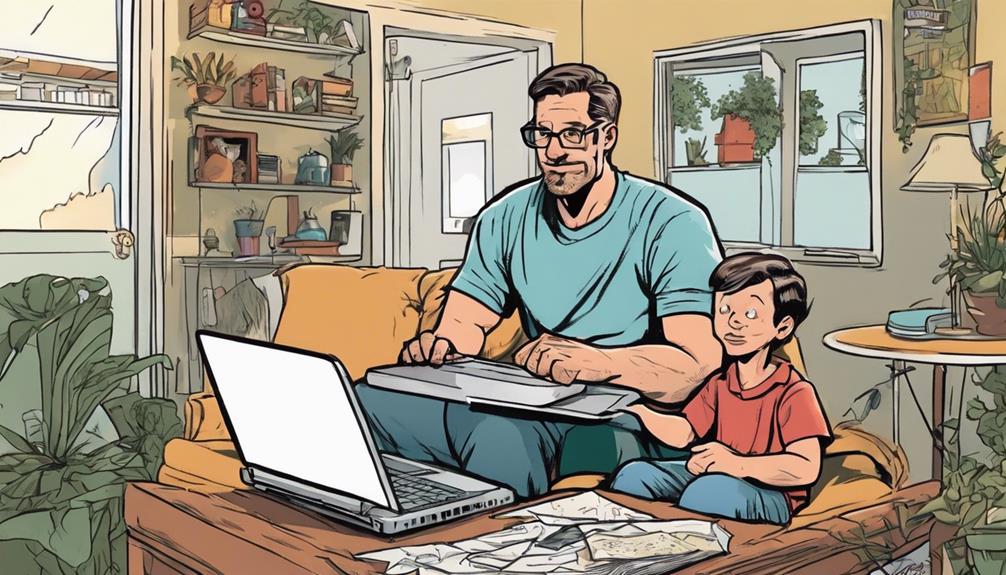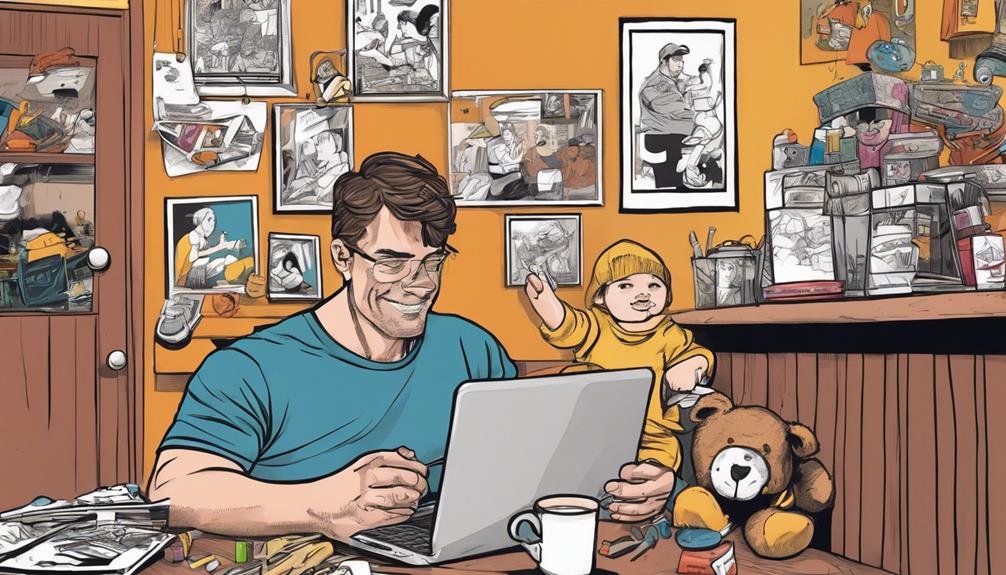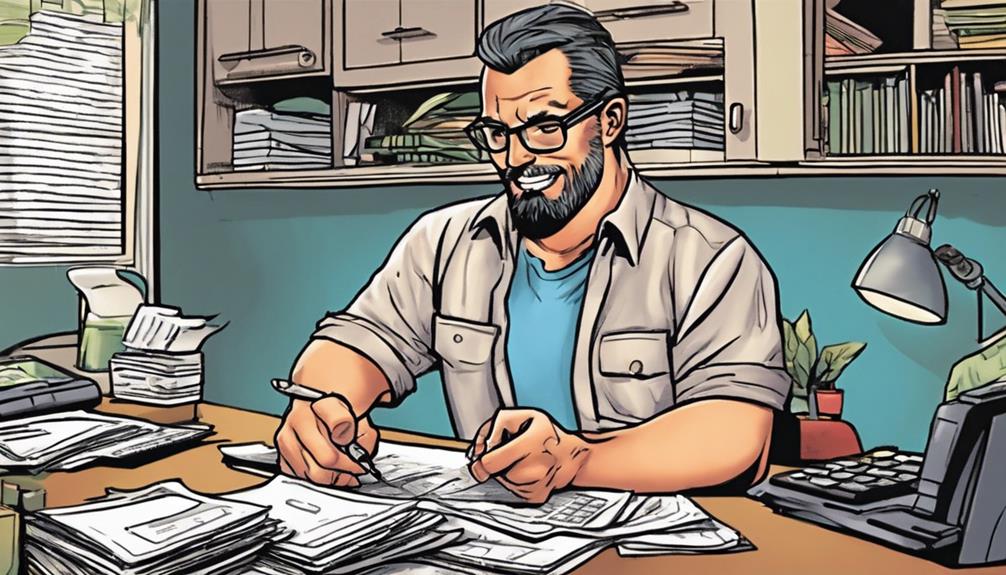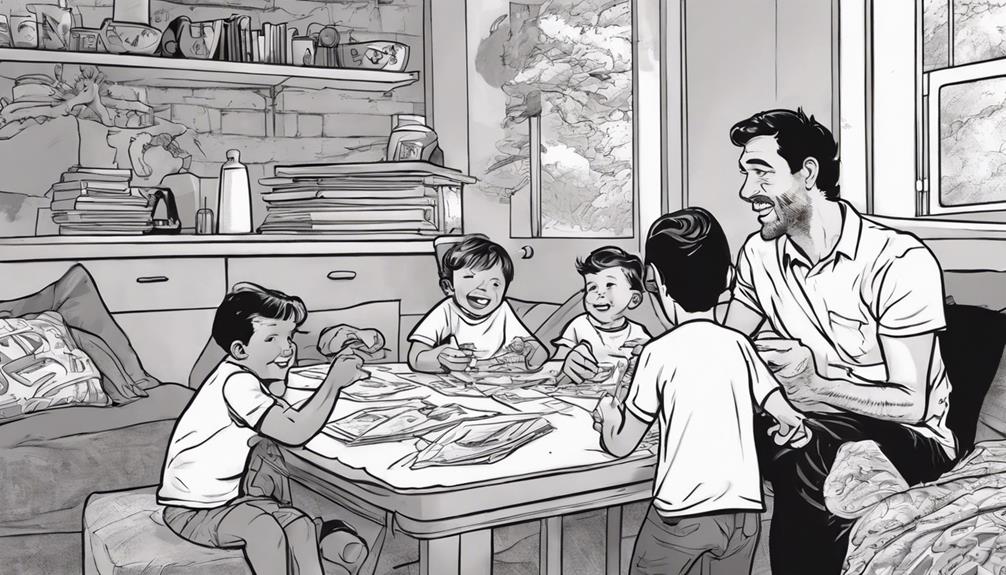Busting myths about stay-at-home dads? Count me in.
I started writing for Modern Dads because, as a stay-at-home dad myself, I’ve lived through the stereotypes. It’s 2023, yet some folks still raise their eyebrows when I say I’m the one doing school runs and packing lunches.
Here’s the deal: stay-at-home dads are more common than you think, and we’re just as capable as moms at managing the home front.
My journey kicked off in 2019 when my wife, Sarah, landed her dream job in New York. We decided I’d stay home with Emily (8) and Liam (5). It wasn’t long before I realized the wealth of misinformation out there. For instance, people assume I’m on permanent vacation.
The truth? My days are packed with tasks that require patience, planning, and a lot of love.
From navigating Emily’s online school sessions to ensuring Liam’s peanut allergy is managed safely, every day is a learning curve.
I’ve mastered the art of multitasking, all while keeping our household running smoothly. It’s a role I take pride in, debunking myths one day at a time.
A Day in the Life of a Modern Stay-at-Home Dad
Just last Thursday, a typical morning unfolded that perfectly encapsulates my life as a stay-at-home dad. Liam, who’s always been my little adventurer, decided he was a ‘chef’ for the day. Armed with a wooden spoon and a determination to make breakfast, he managed to turn our kitchen into what looked like a scene from a food fight.
Amid the chaos, Emily, ever the practical one, was trying to finish her science project. With flour on my face and a glue stick in my hand, I couldn’t help but laugh at the situation.
It was in this moment, surrounded by breakfast gone rogue and school projects, that I realized the significance of my role. Not only am I shaping their daily experiences, but I’m also teaching them life’s messier lessons—like how to find humor in chaos.
Sarah walked in, just in time to join the laughter, and it was clear: these are the moments that make all the misconceptions fade away. Being a stay-at-home dad is about more than just fulfilling duties; it’s about crafting a family life filled with joy, learning, and lots of love.
Key Takeaways
- Stay-at-home dads are competent parents, balancing personal goals with caregiving.
- Financially, stay-at-home dads are not burdens but contribute practically and emotionally.
- Social support and mental health are crucial for stay-at-home dads’ well-being.
- Stay-at-home dads positively impact children, challenging stereotypes and nurturing diverse family dynamics.
Stay-at-Home Dads Are Unemployed

Contrary to popular belief, stay-at-home dads aren’t unemployed; they’ve chosen to prioritize caregiving responsibilities over traditional employment. This choice often challenges societal norms regarding gender roles and the concept of financial independence. By opting to stay at home and care for their children, these dads are actively participating in reshaping these traditional roles.
Financial independence is a crucial aspect of every family’s well-being. When a dad decides to stay at home, it doesn’t mean sacrificing financial stability. It signifies a shift in how families perceive and handle finances. It’s about choosing a different path to support the family unit, one where caregiving is equally valued.
Gender roles have long dictated that men should be the primary breadwinners. Stay-at-home dads challenge this notion by embracing caregiving as a vital role within the family dynamic. This shift not only benefits the children but also contributes to breaking down harmful stereotypes about masculinity and parenting.
Stay-at-Home Dads Are Less Masculine
Despite common misconceptions, stay-at-home dads don’t become less masculine by taking on caregiving roles within their families. Embracing the responsibilities of childcare and homemaking doesn’t diminish a father’s masculinity; rather, it showcases a different aspect of manhood that’s nurturing, compassionate, and involved in family life.
- Challenges: Stay-at-home dads may face challenges such as societal stereotypes that associate caregiving with femininity, leading to feelings of insecurity about their masculinity.
- Support: Seeking support from other stay-at-home dads or parenting groups can help in navigating these challenges and building confidence in their role.
- Redefined Masculinity: Being actively involved in their children’s lives allows stay-at-home dads to redefine traditional notions of masculinity to include qualities like empathy, patience, and emotional intelligence.
- Breaking Stereotypes: By challenging stereotypes and demonstrating that masculinity isn’t limited to traditional breadwinning roles, stay-at-home dads contribute to a more inclusive and diverse understanding of what it means to be a father.
Stay-at-Home Dads Are Less Ambitious

Stay-at-home dads can be just as ambitious as fathers in traditional working roles, pursuing personal and professional goals while also prioritizing their family responsibilities. It’s a common misconception that staying at home with the kids means sacrificing career satisfaction and ambition. In reality, many stay-at-home dads find fulfillment in raising their children while also working towards their professional aspirations.
Managing time effectively is crucial for stay-at-home dads to balance their ambitions with childcare duties. By creating schedules and utilizing time management techniques, these dads can carve out time for both personal growth and family commitments. Finding a routine that works for them enables stay-at-home dads to pursue their goals without neglecting their responsibilities at home.
Career satisfaction for stay-at-home dads often comes from the sense of accomplishment in nurturing their children and achieving their own objectives simultaneously. This dual fulfillment can drive their ambition even further, debunking the myth that they’re less ambitious simply because they prioritize their families.
Stay-at-Home Dads Are Incompetent Parents
While some may question the parenting abilities of stay-at-home dads, it’s important to recognize the diverse and valuable contributions they make to their children’s upbringing. Stay-at-home dads possess excellent parenting skills and play a crucial role in their children’s development.
Here are four reasons why stay-at-home dads are competent parents:
- Nurturing Qualities: Stay-at-home dads are just as nurturing and caring as stay-at-home moms. Parenting isn’t defined by gender but by the love and care provided to the children.
- Adaptability: Stay-at-home dads challenge traditional gender roles by taking on the primary caregiver role. Their ability to adapt to this role showcases their flexibility and commitment to parenting.
- Emotional Support: Stay-at-home dads provide essential emotional support to their children. They create strong bonds and offer a safe space for emotional expression and growth.
- Involvement: Stay-at-home dads are actively involved in their children’s lives. They participate in school activities, playdates, and household responsibilities, showing dedication to their family’s well-being.
Stay-at-Home Dads Are Financial Burdens

Being a stay-at-home dad doesn’t necessarily equate to being a financial burden on the family. In today’s society, traditional gender roles are evolving, and the idea that only men should be the primary breadwinners is outdated. Stay-at-home dads play a crucial role in supporting their families, not just financially, but emotionally and practically as well.
Financial independence isn’t solely dependent on who brings in the paycheck. It’s a shared responsibility within a household. By one parent choosing to stay at home, the family can save on childcare costs, commuting expenses, and other work-related expenditures. This decision can lead to a more financially stable household in the long run.
Challenging traditional gender roles can be empowering for both partners. It allows for a more equitable distribution of responsibilities within the family unit. Stay-at-home dads contribute to breaking down stereotypes and paving the way for a more inclusive society where individuals are free to choose the roles that best suit their family dynamics.
Stay-at-Home Dads Are Socially Isolated
Amidst the misconceptions surrounding stay-at-home dads, it’s important to address the notion that social isolation is a prevalent issue for many in this role. Being a stay-at-home dad can sometimes lead to feelings of loneliness or detachment, but it’s crucial to recognize that there are ways to combat these challenges effectively.
Here are four key points to consider regarding the social isolation of stay-at-home dads:
- Mental Health: It’s essential to prioritize mental well-being by seeking support when needed and engaging in activities that promote mental health.
- Community Support: Building a strong support network within the community can help stay-at-home dads feel connected and less isolated.
- Social Outlets: Encouraging participation in social activities or groups can provide opportunities for social interaction and combat feelings of loneliness.
- Open Communication: Communicating openly with your partner, friends, or other stay-at-home parents about feelings of isolation can lead to understanding and support.
Stay-at-Home Dads Harm Children’s Development

Addressing the misconception that stay-at-home dads harm children’s development is crucial in understanding the valuable role they play in shaping their children’s lives. Parental involvement is a crucial factor in a child’s development, and stay-at-home dads contribute significantly to this aspect. Research shows that children benefit greatly from having a father figure actively engaged in their daily lives.
Contrary to outdated beliefs about gender roles, stay-at-home dads provide a unique perspective on parenting that enhances family dynamics. By challenging traditional norms, they help create a more balanced environment where children learn that caregiving and nurturing aren’t limited by gender. This, in turn, promotes the child’s independence and understanding of diverse family structures.
In today’s world, the definition of a family is evolving, and stay-at-home dads are an integral part of this changing landscape. Their presence enriches children’s lives by showing them that love and support come in various forms, breaking stereotypes, and fostering a more inclusive and nurturing environment for the child’s growth and development.
Male Primary Caregivers Often Misunderstood due to Stay-at-Home Dad Myths
Societal stereotypes and myths often lead to misunderstandings about male primary caregivers. Despite the myths surrounding stay-at-home dads, insights for male carers show that they face unique challenges and provide essential support to their families. Understanding and support for male caregivers can help break down misconceptions and foster greater inclusivity.
Are the Myths About Stay-at-Home Dads Contributing to Their Feelings of Loneliness?
The myths about stay-at-home dads can perpetuate feelings of loneliness and isolation. To combat loneliness as a stay-at-home dad, it’s important to seek support from other parents, join parenting groups, and prioritize self-care. Addressing these misconceptions can help alleviate the sense of isolation that many stay-at-home dads experience.
What Career Sacrifices Do Stay-at-Home Dads Often Make?
Stay-at-home dads often make career sacrifices due to shifting family dynamics. They may put their professional aspirations on hold to focus on childcare and household responsibilities, impacting their long-term career trajectory. Balancing career sacrifices and family dynamics can be a challenging but rewarding experience for these fathers.
Conclusion
When you hear myths about stay-at-home dads, remember, they’re just myths. I believe these dads are as skilled and loving as any parent. They’re not a burden. They’re heroes in their own right, offering a fresh take on parenting.
Have you had experience with stay-at-home dads? Share your stories in the comments below.
And don’t forget to spread the word by sharing this post on social media. Let’s support all the amazing dads out there on our blog, Modern Dads.


Leave a Reply